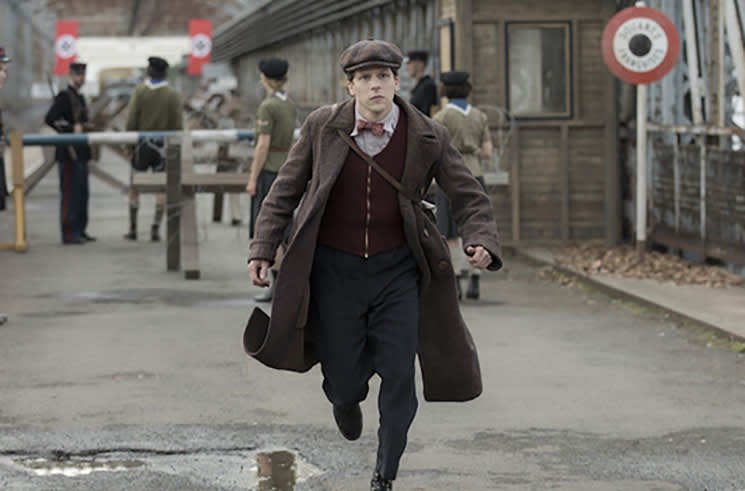It is safe to assume the average viewer of Jonathan Jakubowicz's Resistance would not be readily aware of famed mime artist Marcel Marceau's life story, or his feats of heroism and sacrifice in Nazi-occupied France. Probably most recognized for his cameo in Mel Brooks' Silent Movie, Jakubowicz's biopic aims to provide a thus far lacking depth to Marceau, beyond and before his tenure as mime artist "Bip the Clown" and his passionate advocating for the "art of silence" the world over.
And while the lazily titled Resistance is properly celebratory of Marceau's selfless acts under extraordinary circumstances, the lacking insight into who he was, and the utterly surface exploration of his character, prevents the film from being anything but a rudimentary biopic exercise.
Born to a Jewish butcher in Strasbourg, Marceau (Jesse Eisenberg, struggling desperately to maintain a French accent) is introduced in a formulaic conflict between adhering to his traditionalist father's standards in faith or profession, and his lofty yet fledgling artistic pursuit to perform. Marcel is presented superficially as a winsome creative type who claims art is as natural to him as breathing, but does not provide much more detail than that. Challenged by the extraordinary circumstances of a looming oppressive regime occupying his country, we assume the strident pacifist in Marceau is stirred to fight for the greater good out of obligation, but Resistance leaves its central figure rather underdeveloped and unknowable. We know full well what he did, but the interior of Marceau, his struggles, his journey from irreverent clown to freedom fighter, seem hollow and glossed-over.
The film follows Marceau and his cousin Georges Loinger (Geza Rohrig) as they plot to save the lives of thousands of Jewish children by transporting them under the watchful eyes of the Third Reich. It is within this framing that the film becomes what can best be described as the uncontroversial version of The Day the Clown Cried, as Marceau puts his artistic inclinations to good use by performing for the children they have under their care in a facile and ineffective appeal to the notion of needing reasons to laugh even in dangerous times. Now I'm no judge of mime, but Eisenberg's skills in the art form seem basic at best and the script's attempt to link them to the narrative (much like a mime, the children and the resistance must remain silent to avoid detection, you see) is a stretch that feels forced, since it never amounts to anything significant in the story.
Based on the facts we know about him, this biopic could have been a stirring tale of survival and unexpected heroism if the film had not been so surface-oriented in its approach to Marceau. As we are blocked by the formulaic script and from seeing the person beyond the mime makeup, the film falls into a predictable structure that does not live up to the person who inspired the production or their history. Good intentions only get you so far.
(Game Theory Films)And while the lazily titled Resistance is properly celebratory of Marceau's selfless acts under extraordinary circumstances, the lacking insight into who he was, and the utterly surface exploration of his character, prevents the film from being anything but a rudimentary biopic exercise.
Born to a Jewish butcher in Strasbourg, Marceau (Jesse Eisenberg, struggling desperately to maintain a French accent) is introduced in a formulaic conflict between adhering to his traditionalist father's standards in faith or profession, and his lofty yet fledgling artistic pursuit to perform. Marcel is presented superficially as a winsome creative type who claims art is as natural to him as breathing, but does not provide much more detail than that. Challenged by the extraordinary circumstances of a looming oppressive regime occupying his country, we assume the strident pacifist in Marceau is stirred to fight for the greater good out of obligation, but Resistance leaves its central figure rather underdeveloped and unknowable. We know full well what he did, but the interior of Marceau, his struggles, his journey from irreverent clown to freedom fighter, seem hollow and glossed-over.
The film follows Marceau and his cousin Georges Loinger (Geza Rohrig) as they plot to save the lives of thousands of Jewish children by transporting them under the watchful eyes of the Third Reich. It is within this framing that the film becomes what can best be described as the uncontroversial version of The Day the Clown Cried, as Marceau puts his artistic inclinations to good use by performing for the children they have under their care in a facile and ineffective appeal to the notion of needing reasons to laugh even in dangerous times. Now I'm no judge of mime, but Eisenberg's skills in the art form seem basic at best and the script's attempt to link them to the narrative (much like a mime, the children and the resistance must remain silent to avoid detection, you see) is a stretch that feels forced, since it never amounts to anything significant in the story.
Based on the facts we know about him, this biopic could have been a stirring tale of survival and unexpected heroism if the film had not been so surface-oriented in its approach to Marceau. As we are blocked by the formulaic script and from seeing the person beyond the mime makeup, the film falls into a predictable structure that does not live up to the person who inspired the production or their history. Good intentions only get you so far.




